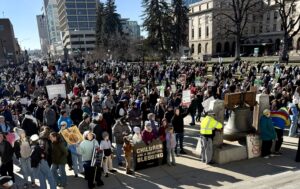
On Tuesday, in the United States Court of Appeals for the Ninth Circuit, attorney James Bopp, Jr., of The Bopp Law Firm, PC, argued that the appellate court should overrule the trial court’s determination that Oregon could lawfully require Oregon Right to Life (“ORTL”), a pro-life organization, to pay for abortion.
The Oregon law in question (the “Mandate”) requires virtually all health insurance plans to cover abortion. Even though ORTL objects to abortion on religious grounds, Oregon declined to provide an exception that would cover ORTL—all while the state did include both secular exceptions and exceptions for other religious organizations in the Mandate. Accordingly, in plain violation of ORTL’s religious liberty, the Mandate requires ORTL to purchase employee insurance plans that cover abortion, the very thing ORTL is devoted to fighting against.
Attorney Bopp explained that the district court overlooked several key factors in its determination. For example, although ORTL had provided ample evidence of its religious beliefs, the trial court doubted ORTL’s religiosity. Similarly, although the Mandate contains numerous secular exceptions, the district court relied on the single religiously-oriented exception (a minor exception which only gave an exemption to churches) to conclude that the law was favorable to religion. The district court even found that another exception that says nothing at all about religion, but instead focuses on coverage offered in 2017, is nonetheless a religious exception.
These findings violated well-established constitutional principles. The government may not require anyone to do something that violates sincere religious belief all while giving others a pass based on secular criteria. Furthermore, the government may not pick and choose religious “winners” and “losers” by creating its own definition of “religious.” Although ORTL showed that Oregon did not and cannot provide any reason sufficient to justify the Mandate’s violation of these principles, the trial court nonetheless ruled against ORTL.
Attorney Bopp also explained that, in addition to longstanding precedent on these issues, the Supreme Court’s rulings in just the past few days show that the appellate court should act. For example, in Catholic Charities Bureau, Inc. v. Wisconsin Labor and Industry Review Commission, decided on June 5, 2025, the Supreme Court found that a Wisconsin law with a remarkably similar exemption for narrowly defined religious entities violated the Constitution’s requirement of religious neutrality.
For all of these reasons, ORTL asked the appellate court to overrule the lower court.
Lois Anderson, ORTL’s executive director, stated, “The attempt by the state to force Oregon Right to Life to finance abortion—the precise human rights violation we are dedicated to opposing—is blatantly unconstitutional and obviously unjust. Oregon Right to Life is clearly exempt from the Mandate and well within our First Amendment rights to follow our sincerely held beliefs. We are confident that—with the help of our excellent legal team—our Constitutional rights will be recognized and upheld by the Ninth Circuit panel.”
Attorney Bopp stated, “This case is saturated with examples of the exact things the Constitution prohibits. The First Amendment does not permit the government to favor secular organizations over religious ones. It does not permit the government to favor only the religious organizations of which it approves. It does not permit the government to draft laws in a way that achieves a religious gerrymander to ensure disfavored religious organizations cannot receive certain benefits. And it does not permit courts to second guess whether an organization’s religious beliefs are, in fact, religious. The Ninth Circuit panel’s decision should be easy since the trial court disregarded the principles in so many ways.”
Watch the oral arguments here, or listen to the audio recording here.
For media inquiries or interviews, please contact James Bopp, Jr. Cell Phone (812) 243-0825; Phone (812)232-2434; Email: jboppjr@aol.com.




